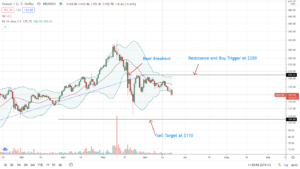
Cryptocurrencies such as Bitcoin and Ethereum are traded on hundreds of various exchanges globally, and the price of a cryptocurrency on one exchange may differ from that on another exchange. Cryptocurrency arbitrage is a method in which traders purchase a cryptocurrency on one exchange and quickly sell that cryptocurrency for a higher price on another exchange. This is where the old Wall Street tactic of ‘arbitrage’ comes into play. ‘Capturing the arb’ refers to profiting from the fact that an asset is selling for a low price in one exchange but a greater price in another. Traders use crypto arbitrage to take advantage of cryptocurrency’s lower price on one exchange by buying and selling it instantly for a higher price on another exchange. Why are the Prices of Cryptocurrencies on Crypto Exchanges so Different? Centralized Exchanges The first thing to understand is that cryptocurrency pricing on centralized exchanges is determined by the order book’s most recent bid-ask matched order. So, the most recent price at which a trader buys or sells a digital asset on an exchange is termed the exchange’s real-time price. For example, if the most recently matched market order on an exchange is to buy bitcoin for $40,000, this price becomes the platform’s newest bitcoin price. The next matching order will determine the cryptocurrency price after that. Therefore, price discovery on exchanges is a constant process of deciding a cryptocurrency market price based on its most recent selling price. Decentralized Exchanges On the other hand, decentralized crypto exchanges utilize a different approach to price crypto assets. This is referred to as an ‘Automatic Market Maker’ approach since it relies on crypto arbitrage traders to keep prices consistent across exchanges. Decentral exchanges use liquidity pools rather than using an order book system to match buyers and sellers to trade cryptocurrencies at a specific price and volume. A separate pool must be set up for each cryptocurrency trading pair. What Are Different Types of Cryptocurrency Arbitrages? The most popular cryptocurrency arbitrage techniques used by crypto traders are discussed below: Deterministic Arbitrage This is the most common arbitrage technique. It entails traders purchasing and selling a digital asset on two exchanges at the same time to profit from market inefficiencies. The trader finds arbitrage opportunities on two different exchanges, buys the asset on the lower-priced platform, then sells the asset at a higher price on the higher-priced platform. Triangular Arbitrage It is also possible to profit from the uncorrelated pricing of three cryptocurrency pairs on an exchange, particularly if one of the cryptocurrencies is underpriced on the platform at the time. A trader may, for example, exchange BTC for ETH, convert ETH to SOL, and then trade SOL back to BTC. To summarise, this procedure entails shifting funds between BTC/ETH, ETH/SOL, and SOL/BTC combinations to accumulate more BTC. Decentralized Arbitration Traders use this approach to perform arbitrage trades on decentralized exchanges (DEXs) like Uniswap, Balancer, and Curve. Arbitrageurs can buy and sell pooled digital assets undervalued or overvalued on these various DEX platforms. These activities inevitably lead to price uniformity across Dexes like centralized crypto exchanges. Statistical Arbitrage This entails leveraging quantitative data models and algorithms to profit from large-scale arbitrage possibilities. Because the process is automated, an arbitrageur can make hundreds of deals in a matter of minutes, significantly increasing his or her profit potential. Risks involved in Cryptocurrency Arbitrage Losses To be successful in crypto arbitrage, traders must execute trades fast so that they can profit from cryptocurrency price disparities across exchanges while they are still profitable. A trader must be careful not to boost the buying price and decrease the selling price of a token by their own trades, especially in the thinly traded types of crypto that provide the widest spreads. Volume All crypto exchanges work similarly, and the pricing of crypto depends on the exchange’s most recent trade. It is important to remember that all trades are not made equal. Some trades happen with massive amounts of money, while others don’t trade with larger amounts. The trading volume on each influences the liquidity and accessible prices on a given exchange. Low volume could indicate that the exchange cannot execute a large enough trade to generate an investor’s profit. Low volume could also indicate that the trade is doable but will take too long to execute. Costs of Transactions Simultaneously, traders must watch the transaction fees associated with buying cryptocurrencies on different trading platforms. These fees will continue to fluctuate as the cryptocurrency markets develop, changing from exchange to exchange. Hacks & Fraud The cryptocurrency industry is mainly unregulated. There are also more chances of hacking, fraud, and monetary collapse. As a result, storing cryptocurrency safely is a hot topic among investors.
The post All you Should Know About Cryptocurrency Arbitrage appeared first on Cryptoknowmics-Crypto News and Media Platform.
- "
- 000
- About
- across
- activities
- ADvantage
- algorithms
- All
- among
- amounts
- Another
- approach
- arbitrage
- asset
- Assets
- Automated
- Bitcoin
- Bitcoin Price
- BTC
- buy
- buy bitcoin
- Buying
- chances
- combinations
- Common
- continue
- Costs
- could
- crypto
- Crypto Exchanges
- crypto traders
- cryptocurrencies
- cryptocurrency
- cryptocurrency market
- cryptocurrency trading
- curve
- data
- Deals
- decentralized
- develop
- Dex
- differ
- different
- digital
- Digital Asset
- Digital Assets
- discovery
- Display
- especially
- ETH
- ethereum
- example
- exchange
- Exchanges
- FAST
- Fees
- finds
- First
- fraud
- funds
- generate
- Globally
- hacking
- hacks
- HTTPS
- Hundreds
- important
- industry
- Investors
- involved
- IT
- large
- larger
- lead
- Liquidity
- Long
- Market
- Markets
- Match
- Matter
- Media
- models
- money
- most
- Most Popular
- news
- opportunities
- order
- Other
- platform
- Platforms
- Play
- pool
- Pools
- Popular
- possibilities
- possible
- price
- pricing
- process
- Profit
- profitable
- provide
- purchase
- purchasing
- quantitative
- quickly
- real-time
- sell
- Sellers
- set
- So
- statistical
- street
- successful
- system
- techniques
- time
- token
- trade
- Trade Cryptocurrencies
- trader
- Traders
- trades
- Trading
- transaction
- Transactions
- understand
- Uniswap
- use
- utilize
- volume
- Wall Street
- Watch
- What
- Work













